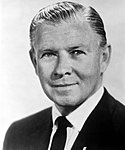1964 United States Senate election in California
This article needs additional citations for verification. (June 2020) |
| |||||||||||||||||
| |||||||||||||||||
 County results Murphy: 50–60% 60–70% 70–80% | |||||||||||||||||
| |||||||||||||||||
| Elections in California |
|---|
 |
The 1964 United States Senate election in California was held on November 3, 1964.
Incumbent Democratic Senator Clair Engle, who had been first elected in 1958, underwent surgery for a brain tumor in August 1963. Facing a primary challenge from Alan Cranston and deteriorating health, he withdrew from the race in April 1964. The primary election was won by Pierre Salinger, Press Secretary to President Lyndon Johnson. When Engle died in July, Salinger was appointed as interim senator in his place.
Salinger lost election to a full six-year term to Republican George Murphy, a retired Hollywood star. This was the only Senate seat Republicans gained in 1964.
Democratic primary
[edit]Candidates
[edit]- Emanuel Braude
- Walter Buchanan, candidate for U.S. Representative in 1934 and 1962
- Demos Cordeiro
- Alan Cranston, California Controller
- Harold E. Fields
- Lynn Johnston, candidate for U.S. Representative in 1963
- George H. McLain, perennial candidate, nativist, and pensioner advocate
- Henry A. Mermel
- Mark Morris
- Guido Joseph Pavia, resident of Napa
- Pierre Salinger, White House Press Secretary
Declined to run
[edit]- Stanley Mosk, California Attorney General (appointed to California Supreme Court)
Withdrew
[edit]- Clair Engle, incumbent Senator (died July 30)
Campaign
[edit]On August 24, 1963, Senator Clair Engle underwent surgery to remove a brain tumor, which left him partially paralyzed, forcing him to miss several Senate sessions. Despite this, he was expected to recover and proceeded with his re-election campaign. By March 1964, California State Controller Alan Cranston had entered the race and received the endorsement of the California Democratic Council.[1]
On April 13, 1964, Engle's illness was evident as he attempted to introduce a resolution to delay construction of the Bodega Bay Nuclear Power Plant. He was given permission to speak but was physically unable, and a colleague presented the resolution instead. Engle officially ended his re-election campaign on April 28, 1964, just four days after undergoing his second operation in eight months.[citation needed] He chose not to endorse either Cranston or Salinger.
A major point of contention during the primary and general elections was Salinger's eligibility to run. Though he was born in San Francisco and attended high school there, he was working at the White House at the time and officially a resident of Virginia, meaning he could not vote for himself.
Results
[edit]| Party | Candidate | Votes | % | |
|---|---|---|---|---|
| Democratic | Pierre Salinger | 1,177,517 | 44.26% | |
| Democratic | Alan Cranston | 1,037,748 | 39.01% | |
| Democratic | George H. McLain | 180,405 | 6.78% | |
| Democratic | Clair Engle (incumbent) (withdrawn) | 119,967 | 4.51% | |
| Democratic | Lynn W. Johnston | 43,744 | 1.64% | |
| Democratic | Walter R. Buchanan | 24,903 | 0.91% | |
| Democratic | Guido Joseph Pavia | 16,562 | 0.62% | |
| Democratic | Harold E. Fields | 16,061 | 0.60% | |
| Democratic | Demos Cordeiro | 15,696 | 0.59% | |
| Democratic | Mark Morris | 12,357 | 0.46% | |
| Democratic | Emanuel Braude | 10,064 | 0.38% | |
| Democratic | Henry A. Mermel | 6,092 | 0.23% | |
| Total votes | 2,660,306 | 100.00% | ||
Republican primary
[edit]Candidates
[edit]- Fred Hall, former Governor of Kansas
- Leland M. Kaiser, San Francisco financier[1]
- George Murphy, actor, film executive, and former President of the Screen Actors Guild
Campaign
[edit]At the California Republican Assembly convention in March, which was overwhelmingly attended by supporters of Barry Goldwater, Murphy was endorsed over Kaiser. During the convention, former Governor of Kansas Fred Hall entered the race, denouncing the influence of the John Birch Society and "the ultra-right wing of the conservatives."[1] Both Kaiser and Murphy were regarded as conservative, Goldwater-friendly candidates, while Hall was a moderate who identified as "a Rockefeller candidate."[1]
Results
[edit]| Party | Candidate | Votes | % | |
|---|---|---|---|---|
| Republican | George Murphy | 1,121,591 | 54.13% | |
| Republican | Leland M. Kaiser | 689,323 | 33.27% | |
| Republican | Fred Hall | 261,036 | 12.60% | |
| Total votes | 2,071,950 | 100.00% | ||
General election
[edit]Results
[edit]| Party | Candidate | Votes | % | ±% | |
|---|---|---|---|---|---|
| Republican | George Murphy | 3,628,552 | 51.54% | ||
| Democratic | Pierre Salinger (incumbent) | 3,411,915 | 48.46% | ||
| Total votes | 7,040,467 | 100.00 | |||
See also
[edit]References
[edit]- ^ a b c d "Goldwater Wins Support Of California G.O.P. Unit; GOLDWATER WINS BACKING ON COAST". The New York Times. March 16, 1964. p. 1.
- ^ "CA US Senate - D Primary". OurCampaigns. Retrieved November 12, 2019.
- ^ "CA US Senate - R Primary". OurCampaigns. Retrieved June 17, 2020.
- ^ "Our Campaigns - CA US Senate Race - Nov 03, 1964". OurCampaigns. Retrieved November 12, 2019.
Further reading
[edit]- Anderson, Totton J.; Lee, Eugene C. (1965). "The 1964 Election in California". The Western Political Quarterly. 18 (2). University of Utah: 451–74. doi:10.1177/1065912965018002-204. JSTOR 445290.


 French
French Deutsch
Deutsch
